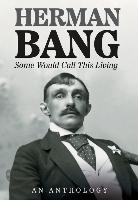Herman Bang (1857-1912) was a sharp-witted observer of the society and manners of his age; with an eye for telling details, he could at one moment mercilessly puncture hypocrisy and arrogance, at the next invoke indignant sympathy for the outcasts and failures of a ruthlessly competitive world. In his novels and especially in his short stories he often takes as his protagonist an unremarkable character who might be dismissed by a casual observer as uninteresting: a failed ballet dancer who scrapes a living as a peripatetic dance teacher in outlying villages ('Irene Holm'), or a lodging-house-keeper's daughter who toils from dawn to dusk to make ends meet ('Frøken Caja'). He can also make wicked fun of pretensions and plots, as in 'The Ravens', where the family of the aging Frøken Sejer are scheming to have her declared incapable, whilst she is selling off her valuables behind their backs to cheat them of their inheritance. His wide-ranging journalism has many targets, alerting readers to the wretched poverty hidden just a few steps from the thriving city shops or the ineptitude of Europe's ruling houses - as well as celebrating the innovations of the modern age, such as the automobile or the department store.

